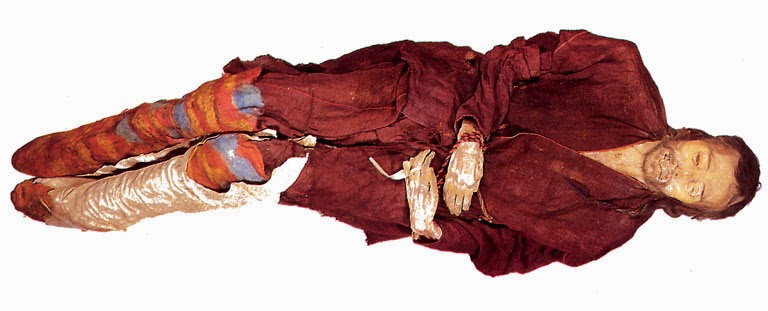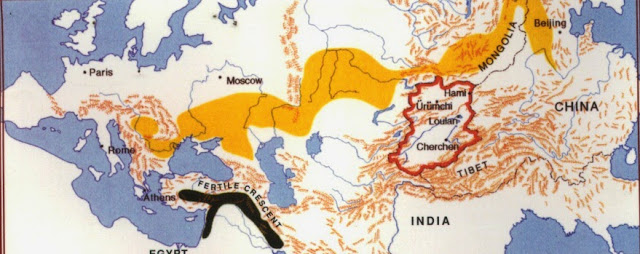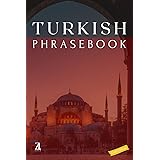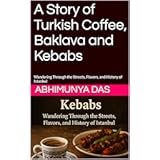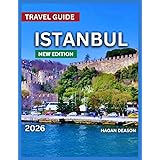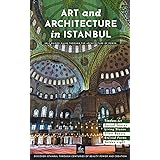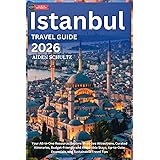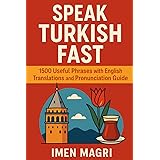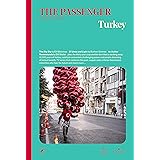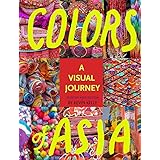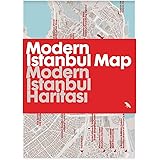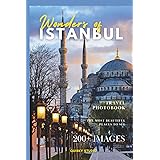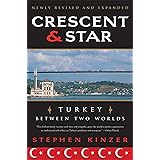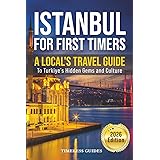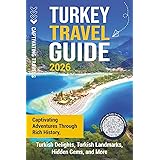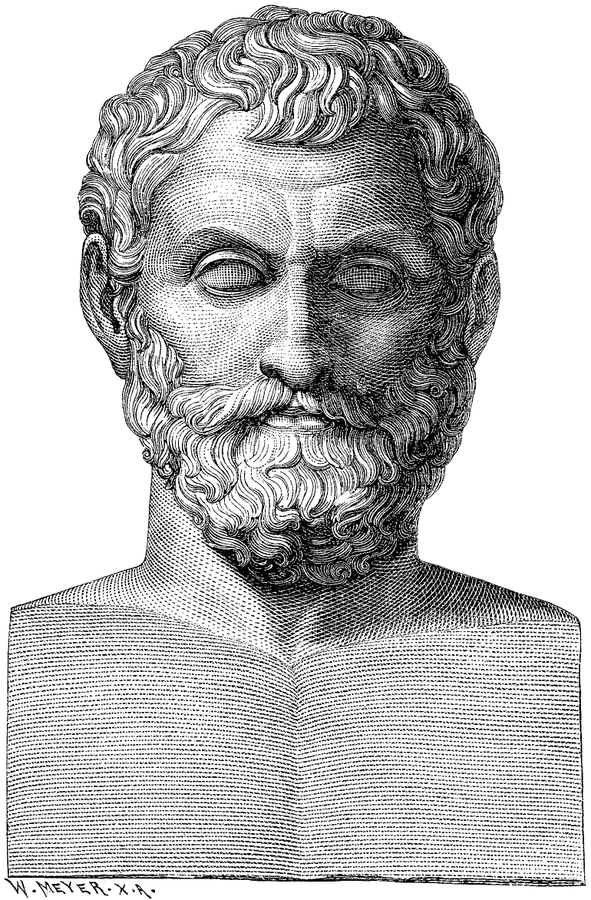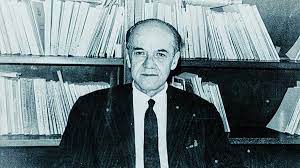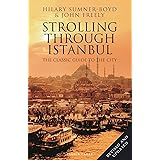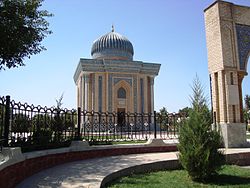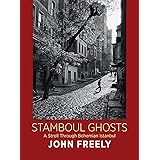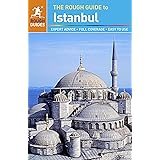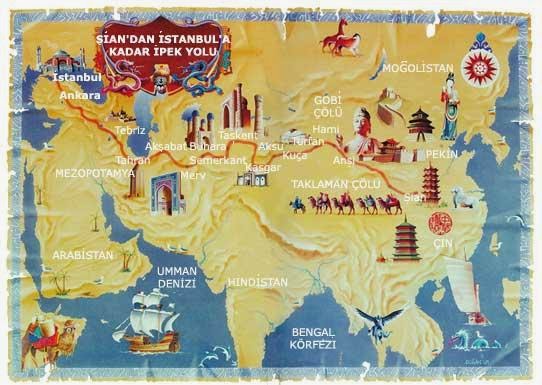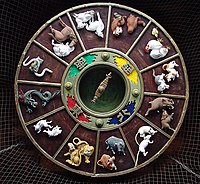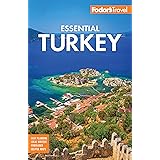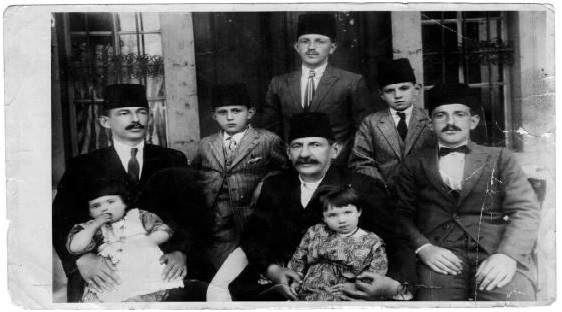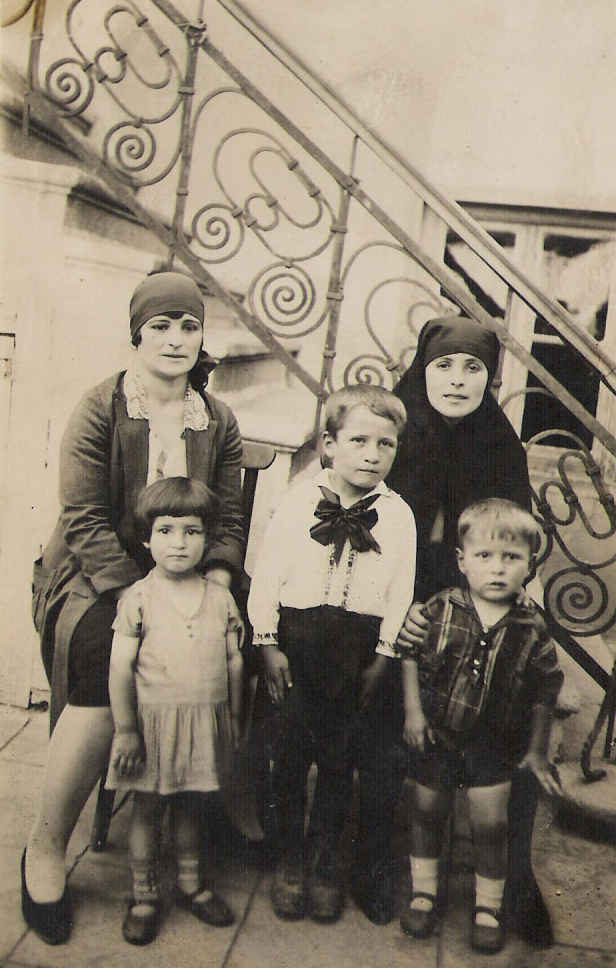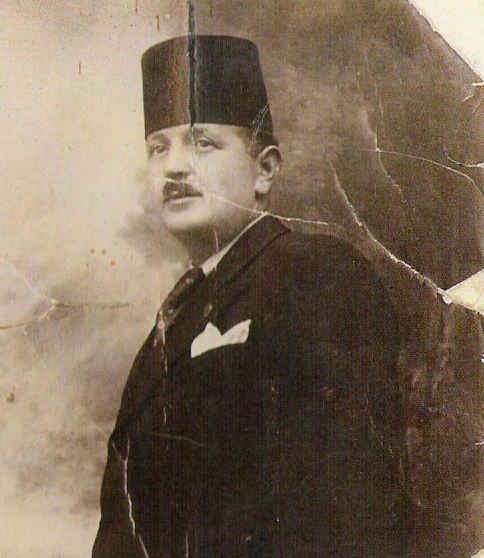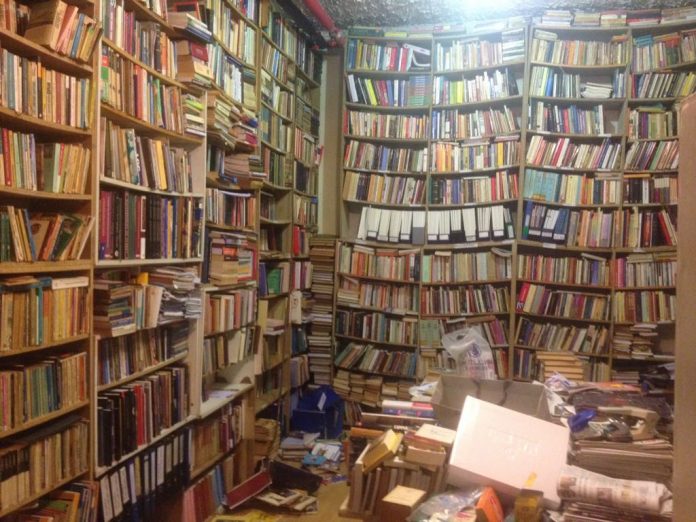Turkish origin words in English
Turkish origin words in English
Modern Istanbul Map / Modern Istanbul Haritasi: Guide to Modern Architecture in Istanbul, Turkey (Blue Crow Media Architecture Maps)
$13.00 (as of 05/02/2026 22:15 GMT +03:00 - More infoProduct prices and availability are accurate as of the date/time indicated and are subject to change. Any price and availability information displayed on [relevant Amazon Site(s), as applicable] at the time of purchase will apply to the purchase of this product.)Speak Turkish Fast: 1500 Useful Phrases with English Translations and Pronunciation Guide
$21.27 (as of 05/02/2026 22:15 GMT +03:00 - More infoProduct prices and availability are accurate as of the date/time indicated and are subject to change. Any price and availability information displayed on [relevant Amazon Site(s), as applicable] at the time of purchase will apply to the purchase of this product.)The Turkish Cookbook
$42.79 (as of 05/02/2026 22:15 GMT +03:00 - More infoProduct prices and availability are accurate as of the date/time indicated and are subject to change. Any price and availability information displayed on [relevant Amazon Site(s), as applicable] at the time of purchase will apply to the purchase of this product.)The History of Istanbul: From Byzantion to Modern Times (History of Turkey Books)
$15.99 (as of 05/02/2026 22:15 GMT +03:00 - More infoProduct prices and availability are accurate as of the date/time indicated and are subject to change. Any price and availability information displayed on [relevant Amazon Site(s), as applicable] at the time of purchase will apply to the purchase of this product.)Rick Steves Istanbul: With Ephesus & Cappadocia
$3.38 (as of 05/02/2026 22:15 GMT +03:00 - More infoProduct prices and availability are accurate as of the date/time indicated and are subject to change. Any price and availability information displayed on [relevant Amazon Site(s), as applicable] at the time of purchase will apply to the purchase of this product.)To the City: Life and Death Along the Ancient Walls of Istanbul
$1.92 (as of 05/02/2026 22:15 GMT +03:00 - More infoProduct prices and availability are accurate as of the date/time indicated and are subject to change. Any price and availability information displayed on [relevant Amazon Site(s), as applicable] at the time of purchase will apply to the purchase of this product.)Wonders of Istanbul: A Photo Collection of the City’s Most Beautiful Places to See – A Stunning Coffee Table Travel Photobook
$23.99 (as of 05/02/2026 22:15 GMT +03:00 - More infoProduct prices and availability are accurate as of the date/time indicated and are subject to change. Any price and availability information displayed on [relevant Amazon Site(s), as applicable] at the time of purchase will apply to the purchase of this product.)Istanbul Travel Guide 2025/2026: Sultanahmet, Beyoğlu: Shopping and Nightlife, Kadıköy, Balat and Fener, Markets and Shopping,Hagia Sophia,Must-See ... Galata Tower. (Best Travel Guides 2025)
$11.99 (as of 05/02/2026 22:15 GMT +03:00 - More infoProduct prices and availability are accurate as of the date/time indicated and are subject to change. Any price and availability information displayed on [relevant Amazon Site(s), as applicable] at the time of purchase will apply to the purchase of this product.)Istanbul Travel Guide 2026: Your All-in-One Resource: Explore Must-See Attractions, Curated Itineraries, Budget-Friendly and Accessible Stays, Up-to-Date Essentials, and Sustainable Travel Tips
$15.99 (as of 05/02/2026 22:15 GMT +03:00 - More infoProduct prices and availability are accurate as of the date/time indicated and are subject to change. Any price and availability information displayed on [relevant Amazon Site(s), as applicable] at the time of purchase will apply to the purchase of this product.)Laminated Istanbul Map by Borch (English) (English, Spanish, French, Italian and German Edition)
$5.96 (as of 05/02/2026 22:15 GMT +03:00 - More infoProduct prices and availability are accurate as of the date/time indicated and are subject to change. Any price and availability information displayed on [relevant Amazon Site(s), as applicable] at the time of purchase will apply to the purchase of this product.)Istanbul: Memories and the City (Vintage International)
$1.11 (as of 05/02/2026 22:20 GMT +03:00 - More infoProduct prices and availability are accurate as of the date/time indicated and are subject to change. Any price and availability information displayed on [relevant Amazon Site(s), as applicable] at the time of purchase will apply to the purchase of this product.)The Passenger: Turkey
$15.74 (as of 05/02/2026 22:20 GMT +03:00 - More infoProduct prices and availability are accurate as of the date/time indicated and are subject to change. Any price and availability information displayed on [relevant Amazon Site(s), as applicable] at the time of purchase will apply to the purchase of this product.)Istanbul Travel Guide 2025: Discover Istanbul’s Top Attractions, Hidden Gems, Cultural Highlights, Timely Itineraries, and Budget-Friendly Hacks for Every Traveler
$0.99 (as of 05/02/2026 22:20 GMT +03:00 - More infoProduct prices and availability are accurate as of the date/time indicated and are subject to change. Any price and availability information displayed on [relevant Amazon Site(s), as applicable] at the time of purchase will apply to the purchase of this product.)Colors of Asia: A Visual Journey
$34.00 (as of 05/02/2026 22:20 GMT +03:00 - More infoProduct prices and availability are accurate as of the date/time indicated and are subject to change. Any price and availability information displayed on [relevant Amazon Site(s), as applicable] at the time of purchase will apply to the purchase of this product.)High Albania
$0.99 (as of 05/02/2026 22:20 GMT +03:00 - More infoProduct prices and availability are accurate as of the date/time indicated and are subject to change. Any price and availability information displayed on [relevant Amazon Site(s), as applicable] at the time of purchase will apply to the purchase of this product.)Istanbul, City map 1:10.000, City Pocket map + The Big Five
$13.62 (as of 05/02/2026 22:20 GMT +03:00 - More infoProduct prices and availability are accurate as of the date/time indicated and are subject to change. Any price and availability information displayed on [relevant Amazon Site(s), as applicable] at the time of purchase will apply to the purchase of this product.)The Christian Traveler's Guide to the Holy Land
$9.97 (as of 05/02/2026 22:20 GMT +03:00 - More infoProduct prices and availability are accurate as of the date/time indicated and are subject to change. Any price and availability information displayed on [relevant Amazon Site(s), as applicable] at the time of purchase will apply to the purchase of this product.)Lonely Planet Turkiye (Travel Guide)
$12.77 (as of 05/02/2026 22:20 GMT +03:00 - More infoProduct prices and availability are accurate as of the date/time indicated and are subject to change. Any price and availability information displayed on [relevant Amazon Site(s), as applicable] at the time of purchase will apply to the purchase of this product.)A Guide to Biblical Sites in Greece and Turkey
$15.90 (as of 05/02/2026 22:20 GMT +03:00 - More infoProduct prices and availability are accurate as of the date/time indicated and are subject to change. Any price and availability information displayed on [relevant Amazon Site(s), as applicable] at the time of purchase will apply to the purchase of this product.)Crescent and Star: Turkey Between Two Worlds
$6.49 (as of 05/02/2026 22:20 GMT +03:00 - More infoProduct prices and availability are accurate as of the date/time indicated and are subject to change. Any price and availability information displayed on [relevant Amazon Site(s), as applicable] at the time of purchase will apply to the purchase of this product.)Water and Human Civilisation
WATER AND HUMAN CIVILISATION
The Sumerian texts constitute man’s oldest known written documents and in the Gilgamesh Epic the term “Garden of the Sun” was used to signify the concept of paradise.
As mentioned in the Old Testament, the exact location of this heavenly area was the Anatolian Turkish landmass lying between the sources of the Tigris and Euphrates Rivers.
“Then the lord God planted a garden in Eden, in the east, and he placed there the man he had formed. A river rises in Eden to water the garden; beyond there it divides and becomes four branches. The name of the third river is the Tigris; it is the one that flows east of Ashur. The fourth river is Euphrates. Old Testament. Genesis (2:10-14)
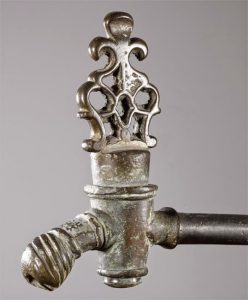
“The “Garden of the Lord” mentioned in the Book of Genesis in the Old Testament is called Eden, and is synonymous with “heaven” or “paradise”.
Water has invaluable contributions to human civilisation on earth.
Human can survive without food but not water.
We are all human brothers were born to earth with drop ofwater and farewelled with water again.
We, Turks, has created a water civilisation from Danube to Euphrates and Tigris and from Nile to Volga with architectural monuments of bridges, water belts, baths (hammams), shadirvans and fountains.
Turkish Bath is world famous.
Turkish Construction History hosts the first examples of the water architectural monuments created by the mankind in the world.
AB-ı Hayat Anatolian Water Civilizations Museum, Istanbul, Turkey
Ab-ı Hayat Anadolu Water Civilizations collection, museum and events are the sustainable social responsibility project of Adell Faucet & Valve Manufacturing Co. Inc. We are pleased to undertake and carry out this project in connection with our product groups and to contribute to the cultural and artistic life of our country and the world by producing social benefits.
As a hobby of the owners of the company, the collection of artifacts, which started 35 years ago, turned into a corporate social responsibility project and came into the present day as a thematic museum with it’s activities.
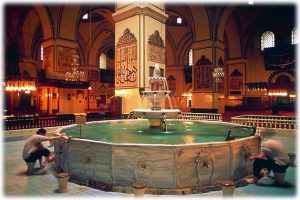
Collection; It tells the story of the reverence and value of the living beings which are created from water in the Roman, Byzantine, Seljuk and Ottoman Empires, which were born and lived in Anatolia and spread to the world,. The stories of each of the works, which bear many traces of hands, eyes and hearts, are more valuable than themselves and each of them carries the details and cultural codes of the period, the life style of the Anatolian people, daily rituals, art, belief systems and civilization elements.
Historical taps, faucets, water containers, pitchers, basins, boilers, healing bowls, clogs, towels, manuscripts in our collection are made of copper, bronze, ceramics, earthenware, leather and wood. Each of the works that are witnesses of time and they are unique works made with traditional Anatolian handcrafts such as shaping copper, weaving, calligraphy, ceramics, marbling and miniature.
We want that this heritage, which is a common accumulation and acquisition of the humanity of the world, this civilization should not be left unattended and disappear. Let our children and people all over the world know the richness, universal message and civilization values of Anatolia.
We want all people, animals and plants to be gathered under the umbrella of the “World Water Brotherhood” without any distinction of religion, language, nation and color, and that water should be instrumental in peace, love and unity of our world, not wars.
We want to contribute to the construction of a sustainable future where the greatest common value of all living things are loved, preserved and protected, moreover using water effectively without wasting it. Water shortage shouldn’t be a cause of diseases and deaths in any part of our world, the people of the world have reached the water and we do not worry about thirst for future generations.
TEMPORARY EXHIBITIONS – 2019 – “HEALING FROM WATER” EXHIBITION
We care that our collection will meet with our students, people from 7 to 77 years in Turkey and abroad. For this purpose, we bring together our civilization values with the people of the region, city, country and the world by opening poster exhibitions consisting of temporary exhibitions of products and posters with sometimes product visuals and English-Turkish explanations. Our exhibitions attract students and local people from young to old.
From time to time, the concept and products are changed and shared with people from domestic and abroad, scientists, government administrators and students to understand all aspects of a wide civilization.
In 2019 we opened an exhibition entitled Water Healing from Past to Present Water Culture at Pendik Municipality Mehmet Akif Ersoy Culture and Art Center in Istanbul. The exhibition consists of unique works in our collection fromAdell Ab-ı Hayat Water Civilization. Curated by Erkan Doğanay, the exhibition presented a nostalgic experience.
Adell Ab-ı Hayat / Collection of Water Civilization
Water is the life, the elixir of life. Water, having the power of purification and cleaning, is the symbol of purity, simplicity and wisdom in all civilizations. Ab-ı Hayat (Adam’s Ale), the water of immortality, means sweet and fresh water whose drops give an endless life. Fountains, hamams (Turkish public baths), ‘şadırvan’ (a fountain used for ritual ablutions), cisterns, water canals and aqueducts have risen as the artifacts of this civilization throughout history. That’s why we named our collection of water civilization as “Ab-ı Hayat (Adam’s Ale)” as an expression of tribute and respect to water.
Adell Armatur collects historical artifacts related to our water civilization as a sustainable social responsibility project in order to improve public awareness about water, introduce the water civilization and hamam culture from past to present, bring the values sinking into oblivion to light. It also organizes trainings and seminars, and holds exhibitions on water saving and water management. Our Ab-ı Hayat (Adam’s Ale) Collection of Water Civilization aims to present the phases of our water civilization with its deep rooted history.
Some parts of the Adell Armatur collection were exhibited at the World Water Forum, in 2009. The exhibition “Past to Present Water and Water Culture in Istanbul” was held within the İstanbul 2010, European Capital of Culture events. The exhibition “From the Source to the Demijohn” was held at the 3rd İstanbul International Water Forum in 2011; “Bathing in the Ottoman tradition – Hamam” was held at Tuyap Unicera Fair in 2011; “Living with water” was held at the Tuyap Unicera Fair in 2012; and lastly “The Friends of Water” was held at the Tuyap Construction Fear in 2012. Adell Mixer took part in the organization committee of the International Conference on “Water in ancient civilizations” and presented 3 declarations at the conference.
Adell Armatur collection of water civilization is exhibited at a permanent exhibition hall of the head office in İkitelli Organized Industrial Zone and is open to visits. You can discover details of Ab-i Hayat Water Collection activities our web site. (sumedeniyetimuzesi.com)
Chinese Philosophy and Water
YONG: Everlasting; Perpetual; forever
One generation comes and and another goes, but water flows on incessantly in a continuous cycle.
. 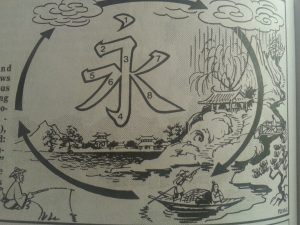
From this unceasing flow of water came the ideograph for “everlasting”: a variation of water, with foams and ripples added: water will be remembered as the “everlasting” character that embodies the eight fundamental strokes used in calligraphy.
Istanbul Travel Guide 2026: Your All-in-One Resource: Explore Must-See Attractions, Curated Itineraries, Budget-Friendly and Accessible Stays, Up-to-Date Essentials, and Sustainable Travel Tips
$15.99 (as of 05/02/2026 22:15 GMT +03:00 - More infoProduct prices and availability are accurate as of the date/time indicated and are subject to change. Any price and availability information displayed on [relevant Amazon Site(s), as applicable] at the time of purchase will apply to the purchase of this product.)To the City: Life and Death Along the Ancient Walls of Istanbul
$1.92 (as of 05/02/2026 22:15 GMT +03:00 - More infoProduct prices and availability are accurate as of the date/time indicated and are subject to change. Any price and availability information displayed on [relevant Amazon Site(s), as applicable] at the time of purchase will apply to the purchase of this product.)DK Eyewitness Travel Guide Istanbul (Eyewitness Travel Guides)
$10.44 (as of 05/02/2026 22:15 GMT +03:00 - More infoProduct prices and availability are accurate as of the date/time indicated and are subject to change. Any price and availability information displayed on [relevant Amazon Site(s), as applicable] at the time of purchase will apply to the purchase of this product.)A Story of Turkish Coffee, Baklava and Kebabs: Wandering Through the Streets, Flavors, and History of Istanbul
$2.99 (as of 05/02/2026 22:15 GMT +03:00 - More infoProduct prices and availability are accurate as of the date/time indicated and are subject to change. Any price and availability information displayed on [relevant Amazon Site(s), as applicable] at the time of purchase will apply to the purchase of this product.)Istanbul & Northwest Turkey Travel Reference Map WP
$9.89 (as of 05/02/2026 22:15 GMT +03:00 - More infoProduct prices and availability are accurate as of the date/time indicated and are subject to change. Any price and availability information displayed on [relevant Amazon Site(s), as applicable] at the time of purchase will apply to the purchase of this product.)Modern Istanbul Map / Modern Istanbul Haritasi: Guide to Modern Architecture in Istanbul, Turkey (Blue Crow Media Architecture Maps)
$13.00 (as of 05/02/2026 22:15 GMT +03:00 - More infoProduct prices and availability are accurate as of the date/time indicated and are subject to change. Any price and availability information displayed on [relevant Amazon Site(s), as applicable] at the time of purchase will apply to the purchase of this product.)Istanbul: A Collection of Beautiful Photos for Istanbul Lovers, Coffee Table Picture Book (Travel Photography)
$27.99 (as of 05/02/2026 22:15 GMT +03:00 - More infoProduct prices and availability are accurate as of the date/time indicated and are subject to change. Any price and availability information displayed on [relevant Amazon Site(s), as applicable] at the time of purchase will apply to the purchase of this product.)Istanbul For First Timers: A Local's Travel Guide To Turkiye's Hidden Gems and Culture
$15.99 (as of 05/02/2026 22:15 GMT +03:00 - More infoProduct prices and availability are accurate as of the date/time indicated and are subject to change. Any price and availability information displayed on [relevant Amazon Site(s), as applicable] at the time of purchase will apply to the purchase of this product.)Lonely Planet Pocket Istanbul (Pocket Guide)
$11.93 (as of 05/02/2026 22:15 GMT +03:00 - More infoProduct prices and availability are accurate as of the date/time indicated and are subject to change. Any price and availability information displayed on [relevant Amazon Site(s), as applicable] at the time of purchase will apply to the purchase of this product.)Istanbul Travel Guide 2026: Top Places to Visit, Things to Do, Exploring Neighborhood, Itineraries, Festivals and Events, Food and Drink, Shopping, ... History And Culture. (EXPLORE THE GLOBE)
$13.99 (as of 05/02/2026 22:15 GMT +03:00 - More infoProduct prices and availability are accurate as of the date/time indicated and are subject to change. Any price and availability information displayed on [relevant Amazon Site(s), as applicable] at the time of purchase will apply to the purchase of this product.)Lonely Planet Turkish Phrasebook & Dictionary
$5.40 (as of 05/02/2026 22:20 GMT +03:00 - More infoProduct prices and availability are accurate as of the date/time indicated and are subject to change. Any price and availability information displayed on [relevant Amazon Site(s), as applicable] at the time of purchase will apply to the purchase of this product.)The Amazing Mrs. Pollifax (Mrs. Pollifax Series Book 2)
$5.99 (as of 05/02/2026 22:20 GMT +03:00 - More infoProduct prices and availability are accurate as of the date/time indicated and are subject to change. Any price and availability information displayed on [relevant Amazon Site(s), as applicable] at the time of purchase will apply to the purchase of this product.)Rick Steves Istanbul: With Ephesus & Cappadocia
$3.38 (as of 05/02/2026 22:20 GMT +03:00 - More infoProduct prices and availability are accurate as of the date/time indicated and are subject to change. Any price and availability information displayed on [relevant Amazon Site(s), as applicable] at the time of purchase will apply to the purchase of this product.)Bake Sale
$2.41 (as of 05/02/2026 22:20 GMT +03:00 - More infoProduct prices and availability are accurate as of the date/time indicated and are subject to change. Any price and availability information displayed on [relevant Amazon Site(s), as applicable] at the time of purchase will apply to the purchase of this product.)Lonely Planet Pocket Istanbul (Pocket Guide)
$11.93 (as of 05/02/2026 22:20 GMT +03:00 - More infoProduct prices and availability are accurate as of the date/time indicated and are subject to change. Any price and availability information displayed on [relevant Amazon Site(s), as applicable] at the time of purchase will apply to the purchase of this product.)The Big Book of Turkey Facts: An Educational Country Travel Picture Book for Kids about History, Destination Places, Animals and Many More
$12.59 (as of 05/02/2026 22:20 GMT +03:00 - More infoProduct prices and availability are accurate as of the date/time indicated and are subject to change. Any price and availability information displayed on [relevant Amazon Site(s), as applicable] at the time of purchase will apply to the purchase of this product.)Fodor's Essential Turkey (Full-color Travel Guide)
$3.38 (as of 05/02/2026 22:20 GMT +03:00 - More infoProduct prices and availability are accurate as of the date/time indicated and are subject to change. Any price and availability information displayed on [relevant Amazon Site(s), as applicable] at the time of purchase will apply to the purchase of this product.)The Passenger: Turkey
$15.74 (as of 05/02/2026 22:20 GMT +03:00 - More infoProduct prices and availability are accurate as of the date/time indicated and are subject to change. Any price and availability information displayed on [relevant Amazon Site(s), as applicable] at the time of purchase will apply to the purchase of this product.)DK Top 10 Istanbul (Pocket Travel Guide)
$3.06 (as of 05/02/2026 22:20 GMT +03:00 - More infoProduct prices and availability are accurate as of the date/time indicated and are subject to change. Any price and availability information displayed on [relevant Amazon Site(s), as applicable] at the time of purchase will apply to the purchase of this product.)Turkey Travel Guide: Captivating Adventures through Rich History, Turkish Delights, Turkish Landmarks, Hidden Gems, and More (Traveling the World)
$13.69 (as of 05/02/2026 22:20 GMT +03:00 - More infoProduct prices and availability are accurate as of the date/time indicated and are subject to change. Any price and availability information displayed on [relevant Amazon Site(s), as applicable] at the time of purchase will apply to the purchase of this product.)Philosophers: Turkey and Around
Istanbul Travel Guide 2025/2026: Sultanahmet, Beyoğlu: Shopping and Nightlife, Kadıköy, Balat and Fener, Markets and Shopping,Hagia Sophia,Must-See ... Galata Tower. (Best Travel Guides 2025)
$11.99 (as of 05/02/2026 22:15 GMT +03:00 - More infoProduct prices and availability are accurate as of the date/time indicated and are subject to change. Any price and availability information displayed on [relevant Amazon Site(s), as applicable] at the time of purchase will apply to the purchase of this product.)Wonders of Istanbul: A Photo Collection of the City’s Most Beautiful Places to See – A Stunning Coffee Table Travel Photobook
$23.99 (as of 05/02/2026 22:15 GMT +03:00 - More infoProduct prices and availability are accurate as of the date/time indicated and are subject to change. Any price and availability information displayed on [relevant Amazon Site(s), as applicable] at the time of purchase will apply to the purchase of this product.)Istanbul Travel Guide 2026: Your All-in-One Resource: Explore Must-See Attractions, Curated Itineraries, Budget-Friendly and Accessible Stays, Up-to-Date Essentials, and Sustainable Travel Tips
$15.99 (as of 05/02/2026 22:15 GMT +03:00 - More infoProduct prices and availability are accurate as of the date/time indicated and are subject to change. Any price and availability information displayed on [relevant Amazon Site(s), as applicable] at the time of purchase will apply to the purchase of this product.)TURQUÍA GUÍA DE VIAJE 2025-2026: Explora Estambul, Capadocia, Antalya y Éfeso Como un local: consejos de expertos, joyas ocultas, sitios históricos e ... perfectos para cada viajero (Spanish Edition)
$17.89 (as of 05/02/2026 22:15 GMT +03:00 - More infoProduct prices and availability are accurate as of the date/time indicated and are subject to change. Any price and availability information displayed on [relevant Amazon Site(s), as applicable] at the time of purchase will apply to the purchase of this product.)Laminated Istanbul Map by Borch (English) (English, Spanish, French, Italian and German Edition)
$5.96 (as of 05/02/2026 22:15 GMT +03:00 - More infoProduct prices and availability are accurate as of the date/time indicated and are subject to change. Any price and availability information displayed on [relevant Amazon Site(s), as applicable] at the time of purchase will apply to the purchase of this product.)A Story of Turkish Coffee, Baklava and Kebabs: Wandering Through the Streets, Flavors, and History of Istanbul
$2.99 (as of 05/02/2026 22:15 GMT +03:00 - More infoProduct prices and availability are accurate as of the date/time indicated and are subject to change. Any price and availability information displayed on [relevant Amazon Site(s), as applicable] at the time of purchase will apply to the purchase of this product.)The Mini Rough Guide to Istanbul and the Aegean Coast: Travel Guide with eBook
$9.44 (as of 05/02/2026 22:15 GMT +03:00 - More infoProduct prices and availability are accurate as of the date/time indicated and are subject to change. Any price and availability information displayed on [relevant Amazon Site(s), as applicable] at the time of purchase will apply to the purchase of this product.)Speak Turkish Fast: 1500 Useful Phrases with English Translations and Pronunciation Guide
$21.27 (as of 05/02/2026 22:15 GMT +03:00 - More infoProduct prices and availability are accurate as of the date/time indicated and are subject to change. Any price and availability information displayed on [relevant Amazon Site(s), as applicable] at the time of purchase will apply to the purchase of this product.)The Turkish Cookbook
$42.79 (as of 05/02/2026 22:15 GMT +03:00 - More infoProduct prices and availability are accurate as of the date/time indicated and are subject to change. Any price and availability information displayed on [relevant Amazon Site(s), as applicable] at the time of purchase will apply to the purchase of this product.)Modern Istanbul Map / Modern Istanbul Haritasi: Guide to Modern Architecture in Istanbul, Turkey (Blue Crow Media Architecture Maps)
$13.00 (as of 05/02/2026 22:15 GMT +03:00 - More infoProduct prices and availability are accurate as of the date/time indicated and are subject to change. Any price and availability information displayed on [relevant Amazon Site(s), as applicable] at the time of purchase will apply to the purchase of this product.)DK Top 10 Istanbul (Pocket Travel Guide)
$11.39 (as of 05/02/2026 22:20 GMT +03:00 - More infoProduct prices and availability are accurate as of the date/time indicated and are subject to change. Any price and availability information displayed on [relevant Amazon Site(s), as applicable] at the time of purchase will apply to the purchase of this product.)Fodor's Essential Turkey (Full-color Travel Guide)
$3.38 (as of 05/02/2026 22:20 GMT +03:00 - More infoProduct prices and availability are accurate as of the date/time indicated and are subject to change. Any price and availability information displayed on [relevant Amazon Site(s), as applicable] at the time of purchase will apply to the purchase of this product.)Crescent and Star: Turkey Between Two Worlds
$6.49 (as of 05/02/2026 22:20 GMT +03:00 - More infoProduct prices and availability are accurate as of the date/time indicated and are subject to change. Any price and availability information displayed on [relevant Amazon Site(s), as applicable] at the time of purchase will apply to the purchase of this product.)Turkey Travel Guide: Captivating Adventures through Rich History, Turkish Delights, Turkish Landmarks, Hidden Gems, and More (Traveling the World)
$13.69 (as of 05/02/2026 22:20 GMT +03:00 - More infoProduct prices and availability are accurate as of the date/time indicated and are subject to change. Any price and availability information displayed on [relevant Amazon Site(s), as applicable] at the time of purchase will apply to the purchase of this product.)Istanbul: City of Majesty at the Crossroads of the World
$6.48 (as of 05/02/2026 22:20 GMT +03:00 - More infoProduct prices and availability are accurate as of the date/time indicated and are subject to change. Any price and availability information displayed on [relevant Amazon Site(s), as applicable] at the time of purchase will apply to the purchase of this product.)Bake Sale
$2.41 (as of 05/02/2026 22:20 GMT +03:00 - More infoProduct prices and availability are accurate as of the date/time indicated and are subject to change. Any price and availability information displayed on [relevant Amazon Site(s), as applicable] at the time of purchase will apply to the purchase of this product.)Istanbul Travel Guide 2025: Discover Istanbul’s Top Attractions, Hidden Gems, Cultural Highlights, Timely Itineraries, and Budget-Friendly Hacks for Every Traveler
$0.99 (as of 05/02/2026 22:20 GMT +03:00 - More infoProduct prices and availability are accurate as of the date/time indicated and are subject to change. Any price and availability information displayed on [relevant Amazon Site(s), as applicable] at the time of purchase will apply to the purchase of this product.)Istanbul: Memories and the City (Vintage International)
$1.11 (as of 05/02/2026 22:20 GMT +03:00 - More infoProduct prices and availability are accurate as of the date/time indicated and are subject to change. Any price and availability information displayed on [relevant Amazon Site(s), as applicable] at the time of purchase will apply to the purchase of this product.)Istanbul For First Timers: A Local's Travel Guide To Turkiye's Hidden Gems and Culture
$15.99 (as of 05/02/2026 22:20 GMT +03:00 - More infoProduct prices and availability are accurate as of the date/time indicated and are subject to change. Any price and availability information displayed on [relevant Amazon Site(s), as applicable] at the time of purchase will apply to the purchase of this product.)The Big Book of Turkey Facts: An Educational Country Travel Picture Book for Kids about History, Destination Places, Animals and Many More
$12.59 (as of 05/02/2026 22:20 GMT +03:00 - More infoProduct prices and availability are accurate as of the date/time indicated and are subject to change. Any price and availability information displayed on [relevant Amazon Site(s), as applicable] at the time of purchase will apply to the purchase of this product.)Turkish Thinkers and Thoughts
- Mevlana Jelaluddin Rumi http://www.halukberkmen.net/pdf/.pdf
- Moments of Exaltation http://www.halukberkmen.net/pdf/.pdf
- The Sufi Poet: Yunus Emre http://www.halukberkmen.net/pdf/.pdf
- Sufi Psychology http://www.halukberkmen.net/pdf/.pdf
- The Sufi Universes http://www.halukberkmen.net/pdf/.pdf
Rick Steves Istanbul: With Ephesus & Cappadocia
$3.38 (as of 05/02/2026 22:15 GMT +03:00 - More infoProduct prices and availability are accurate as of the date/time indicated and are subject to change. Any price and availability information displayed on [relevant Amazon Site(s), as applicable] at the time of purchase will apply to the purchase of this product.)Speak Turkish Fast: 1500 Useful Phrases with English Translations and Pronunciation Guide
$21.27 (as of 05/02/2026 22:15 GMT +03:00 - More infoProduct prices and availability are accurate as of the date/time indicated and are subject to change. Any price and availability information displayed on [relevant Amazon Site(s), as applicable] at the time of purchase will apply to the purchase of this product.)Art and Architecture in Istanbul: Self-Guided Walks Through the Architecture of Power (Art and Architecture Guides)
$17.95 (as of 05/02/2026 22:15 GMT +03:00 - More infoProduct prices and availability are accurate as of the date/time indicated and are subject to change. Any price and availability information displayed on [relevant Amazon Site(s), as applicable] at the time of purchase will apply to the purchase of this product.)DK Eyewitness Istanbul (Travel Guide)
$8.33 (as of 05/02/2026 22:15 GMT +03:00 - More infoProduct prices and availability are accurate as of the date/time indicated and are subject to change. Any price and availability information displayed on [relevant Amazon Site(s), as applicable] at the time of purchase will apply to the purchase of this product.)Laminated Istanbul Map by Borch (English) (English, Spanish, French, Italian and German Edition)
$5.96 (as of 05/02/2026 22:15 GMT +03:00 - More infoProduct prices and availability are accurate as of the date/time indicated and are subject to change. Any price and availability information displayed on [relevant Amazon Site(s), as applicable] at the time of purchase will apply to the purchase of this product.)DK Top 10 Istanbul (Pocket Travel Guide)
$11.39 (as of 05/02/2026 22:15 GMT +03:00 - More infoProduct prices and availability are accurate as of the date/time indicated and are subject to change. Any price and availability information displayed on [relevant Amazon Site(s), as applicable] at the time of purchase will apply to the purchase of this product.)Istanbul For First Timers: A Local's Travel Guide To Turkiye's Hidden Gems and Culture
$15.99 (as of 05/02/2026 22:15 GMT +03:00 - More infoProduct prices and availability are accurate as of the date/time indicated and are subject to change. Any price and availability information displayed on [relevant Amazon Site(s), as applicable] at the time of purchase will apply to the purchase of this product.)The Turkish Cookbook
$42.79 (as of 05/02/2026 22:15 GMT +03:00 - More infoProduct prices and availability are accurate as of the date/time indicated and are subject to change. Any price and availability information displayed on [relevant Amazon Site(s), as applicable] at the time of purchase will apply to the purchase of this product.)Istanbul Travel Guide 2025: Discover Istanbul’s Top Attractions, Hidden Gems, Cultural Highlights, Timely Itineraries, and Budget-Friendly Hacks for Every Traveler
$0.99 (as of 05/02/2026 22:15 GMT +03:00 - More infoProduct prices and availability are accurate as of the date/time indicated and are subject to change. Any price and availability information displayed on [relevant Amazon Site(s), as applicable] at the time of purchase will apply to the purchase of this product.)Istanbul Travel Guide 2026: Top Places to Visit, Things to Do, Exploring Neighborhood, Itineraries, Festivals and Events, Food and Drink, Shopping, ... History And Culture. (EXPLORE THE GLOBE)
$13.99 (as of 05/02/2026 22:15 GMT +03:00 - More infoProduct prices and availability are accurate as of the date/time indicated and are subject to change. Any price and availability information displayed on [relevant Amazon Site(s), as applicable] at the time of purchase will apply to the purchase of this product.)Istanbul For First Timers: A Local's Travel Guide To Turkiye's Hidden Gems and Culture
$15.99 (as of 05/02/2026 22:20 GMT +03:00 - More infoProduct prices and availability are accurate as of the date/time indicated and are subject to change. Any price and availability information displayed on [relevant Amazon Site(s), as applicable] at the time of purchase will apply to the purchase of this product.)Fodor's Essential Turkey (Full-color Travel Guide)
$3.38 (as of 05/02/2026 22:20 GMT +03:00 - More infoProduct prices and availability are accurate as of the date/time indicated and are subject to change. Any price and availability information displayed on [relevant Amazon Site(s), as applicable] at the time of purchase will apply to the purchase of this product.)Istanbul: Memories and the City (Vintage International)
$1.11 (as of 05/02/2026 22:20 GMT +03:00 - More infoProduct prices and availability are accurate as of the date/time indicated and are subject to change. Any price and availability information displayed on [relevant Amazon Site(s), as applicable] at the time of purchase will apply to the purchase of this product.)Rick Steves Istanbul: With Ephesus & Cappadocia
$10.45 (as of 05/02/2026 22:20 GMT +03:00 - More infoProduct prices and availability are accurate as of the date/time indicated and are subject to change. Any price and availability information displayed on [relevant Amazon Site(s), as applicable] at the time of purchase will apply to the purchase of this product.)Strolling Through Istanbul: The Classic Guide to the City
$18.47 (as of 05/02/2026 22:20 GMT +03:00 - More infoProduct prices and availability are accurate as of the date/time indicated and are subject to change. Any price and availability information displayed on [relevant Amazon Site(s), as applicable] at the time of purchase will apply to the purchase of this product.)Bake Sale
$2.41 (as of 05/02/2026 22:20 GMT +03:00 - More infoProduct prices and availability are accurate as of the date/time indicated and are subject to change. Any price and availability information displayed on [relevant Amazon Site(s), as applicable] at the time of purchase will apply to the purchase of this product.)High Albania
$0.99 (as of 05/02/2026 22:20 GMT +03:00 - More infoProduct prices and availability are accurate as of the date/time indicated and are subject to change. Any price and availability information displayed on [relevant Amazon Site(s), as applicable] at the time of purchase will apply to the purchase of this product.)Turkey Travel Guide: Captivating Adventures through Rich History, Turkish Delights, Turkish Landmarks, Hidden Gems, and More (Traveling the World)
$13.69 (as of 05/02/2026 22:20 GMT +03:00 - More infoProduct prices and availability are accurate as of the date/time indicated and are subject to change. Any price and availability information displayed on [relevant Amazon Site(s), as applicable] at the time of purchase will apply to the purchase of this product.)Colors of Asia: A Visual Journey
$34.00 (as of 05/02/2026 22:20 GMT +03:00 - More infoProduct prices and availability are accurate as of the date/time indicated and are subject to change. Any price and availability information displayed on [relevant Amazon Site(s), as applicable] at the time of purchase will apply to the purchase of this product.)DK Eyewitness Travel Guide Turkey (Eyewitness Travel Guides)
$12.11 (as of 05/02/2026 22:20 GMT +03:00 - More infoProduct prices and availability are accurate as of the date/time indicated and are subject to change. Any price and availability information displayed on [relevant Amazon Site(s), as applicable] at the time of purchase will apply to the purchase of this product.)Humans with Divine Wisdom by Maturidi
El Maturidi (Uzbekistan) Maturid 870 of Samarkand, 945 of Samarkand. Hanafi theologian, jurist and commentator of the Qur’an (interpreter), founder of Maturidiyya theology, which is named after him. Muhammad Abu Mansur al-Maturidi (853–944). Effective advocate of innovative Islam. He is from Samarkand.
Literature on Maturidi
HUMANS WITH DIVINE WISDOM
Human Beings. Human Rationality
Maturidi managed to combine his view of God and the composition of the world through the concept of wisdom. In the process, wisdom was granted a key role in his general thought process. This impression becomes even stronger when Maturidi’s doctrines on human beings are taken into account.
Due to the wisdom of Allah, reason is given to man. Man differs from other living creatures in proportion to using it. Human beings dominate other living beings with the mind, distinguish between good and evil, gain knowledge with it, contemplate the universe, make use of it, find the creator, recognize and believe. That is, he gets faith. Thus, he finds peace in the world and the hereafter. For this reason, mind is a mercy created by the great creator with wisdom.
According to him, reason and wisdom are the same in many ways. The real wisdom of giving the essence of mind to human beings is to know Allah, His actions and His wisdom in the world, to serve as a servant in the world of wisdom and testing in line with the Creator’s will and to attain happiness in the world and the hereafter. According to Mâtürîdî, the wisdom of the creation of this world to be tested and to pass the test is for the most honorable being, that is, “human”.
The human being is the only created being who perceives all signs based on ḥikma; the only one in this world who reflects on and understands their indications and specifications. From this perspective, human activity constantly relates to divine wisdom because wherever the latter manifests, human intellect is called upon to know and understand what has been manifested. Human rational knowledge, as we have come to know, extends over various domains.
It encompasses ethical norms, analysis of the creation, as well as the proof that there is an omnipotent and omniscient Creator. This is the cornerstone of Maturidi’s entire intellectual edifice and it is no surprise that rational capacity occupies a central position in his definition of the human being. We have come across this definition earlier. It appears in two sentences that are formulated from entirely different perspectives.
The first is based on theological tradition and explains that human beings consist of an intellect and natures. This refers back to Maturidi’s ontological model, according to which a body consists of ṭabāʾiʿ, here incorporating the intellect as an additional accident as well. The second definition, however, states that the human being is “a rational mortal being.”
The universe was created full of wisdom, subtlety and proofs, and it was presented to human beings who had the ability to understand and reason, and wisdom was given to man as the ability to learn what is not taught, to do purposeful work and to do what he does soundly.
To Maturidi, wisdom simply means the assigning of things to their proper place, and giving everyone the share he deserves without disregard or negligence. Concerning the misfortunes and injustices of the world, Maturidi said that the human intellect as a created instrument, has its shortcomings and limits, and so many things are beyond its comprehension, and sometimes it is misled by outside influences from conceiving the real wisdom behind creation, not to mention that of God’s action and His works. For Maturidi, reason alone is unable to explain the existence of evil or apparent hardship which occur in this World.
From the evident order in the world and its being suitable for the living beings, Maturidi argued for the existence of God. According to him, everything in this world displays remarkable and impressive order, and also it indicates the wisdom behind its creation. The whole world is organised in such a way that no-one – even the wisest of men – can comprehend or grasp its real structure. Thus the structure of every object and living being discloses the wisdom and proves the existence of its creator.
Moreover, all the substances of the world are organized in certain ways to serve certain ends, and for the benefit of mankind. Everything is subject to certain patterns of movement and rest to serve certain purposes, all this points to the existence of God who controls the affairs of the whole world.
To Maturidi, the regular revolution of the sun and the moon, and the continuous interchange of days and nights resulting from their revolution, and their following of certain patterns without change or disproportion, proves that they have been designed in this certain way by a supreme being who has eternal knowledge and full control over the affairs of this world.
Men are naturally dependent on each other for their existence and sustenance, and their affairs are arranged in such a way as to make it impossible for each one to be self-sufficient. All this, according to Maturidi, indicates that there is an external force behind this arrangement which has full control over the whole world and that is God, the all knowing the wise and the powerful.
Emphasizing the point that God’s justice and His wisdom make it necessary that certain actions must be attributed to man. Maturidi strongly defended the absolute power of God and His will which influence and embrace all man’s actions. Man is a responsible agent who has been created for judgement (mihna) and has been provided with the means by which he can distinguish between things thus being able to carry out his responsibility. Therefore, he must have real action and must have some freedom to perform these actions. To establish this proposition, Maturidi argued from both reason and revelation. He said that in many Qur’anic verses man has been commanded to do certain works or to refrain from others
Maturidi said that, “some people assumed that whoever acts without intending to benefit others by his actions is not wise, and whoever acts without aiming by his actions towards a certain purpose is fooling around (*abith).” They hold that it is not possible that God would do harm to anyone without deserving such a harm, considering it as obligatory to God to do what is best for others in matters concerning religion, and do for them whatever is good in the outcome.
Thus they limited God’s actions, in the sense that they must be intended either to cause benefit for others, or protect them from harm. They measured God’s acts to those of the wise men in that His actions must be in agreement with the principle of wisdom. They conceded, however, that God differs from the wise men among men, in that His doing or not doing an action would neither elevate nor debase Him, His actions neither bring Him benefit nor defend Him against harm. The wisdom in His actions is basically that they cause benefits and protect others from harm, otherwise they would just be useless. (‘abath).
Since, in general, wisdom and justice are good and injustice and foolishness are bad, we must affirm that all God’s actions are according to wisdom, justice or unmerited grace (fadl) and beneficence (ihsan), because He is the most beneficent, self-sufficient and all-knowing, and it would be inappropriate to ascribe injustice or foolishness to him who has such characteristics.
Since things in relation to justice and injustice, foolishness or wisdom, differ according to the differences of circumstances, it is quite possible that their real nature might be concealed from reason. Therefore, it would be very difficult for human reason to judge God’s actions or His law as being wise or foolish, just or unjust.
Reason, to Maturidi, is a created instrument, which has its shortcomings and limitations. Its judgements are largely influenced by its own circumstances, so it might be afflicted by something which prevents it from distinguishing between wisdom and foolishness. Therefore, we must assume that wisdom exists in all God’s actions whether we are able to conceive it by our intellect or not.
Maturidi said that since God possesses the qualities of essential knowledge, power, might and life, none of which wise men possess, there is no justification in comparing His actions to the actions of the wise men.
Moreover, there is none of the wise men, in the present, who is not liable to foolishness, similarly the self-sufficient and powerful among them is liable to possess the opposite of these qualities. In fact the wise men were possessors of these opposite qualities, then they were given self-sufficiency and power. However, they do not possess these qualities in their absolute natures, but in the limited sense, according to their experience and previous learning. In judging a certain case they have to depend on their stored knowledge and previous experience.
Thus, for a man, regardless of his wisdom, to claim judgement on God’s actions would be presumptious. This can be explained further by the fact that every wise man knows that he is ignorant of so many things, that he is incapable and in need regarding various matters; he also knows very well his foolishness in respect of so many things. A man of such characteristics would be foolish and ignorant to indulge in judgement on God’s actions.
Maturidi added that the reason behind the creation is the fulfillment of God’s commandments and His prohibitions, and the realization of attraction and intimidation. To explain this point, Maturidi said that God created His creature and provided him with all the means of attaining knowledge, and bestowed on him many favours and graces.
Therefore, it is most likely that man should be accountable for his actions, thus would be punished and rewarded according to his conformity with God’s commandments and prohibitions. Thus, to Maturidi, the main purpose behind the creation is the kulfa or mihna, that is, the judgement of man in the hereafter.
As for the second question, that is the existence of evil in the world, Maturidi said that there is a wisdom behind the creation of evil things such as: snakes and harmful substances, though our intellect might not be capable enough to grasp the divine wisdom in that, or fail to know the nature of the wisdom in them. He pointed out that these evil things should be considered in relation to the good ones, in order to attain reasonable explanation for their creation.
Man can attain such knowledge through his intellect, but not all people are able to do so, therefore, these evils are created to warn those who are intellectually incapable of distinguishing between what benefits them and what causes them harm.
Human is a “creature the most honorable” and “caliph” because of his intellect and will and the ability to realize and grip the wisdom. He knows that the world is a field where the wisdom is full in it for Hereafter and says that every creature except for him serve to himself directly or indirectly. Consequently Maturidi founded many subjects related with genesis and divine acts as heaven and earth, beneficence and evil, favor and badness, order and prohibition, prophethood, hereafter, worship, thanksgiving and fate from the perspective of wisdom with reason and revelation.
However, Maturidi does add the qualification that the intellect cannot distinguish the good from the bad in every case. It only knows the basic guidelines and knows, for example, that injustice and ignorance are ugly (qabīḥ), while justice and wisdom are beautiful (ḥasan). In many individual cases, however, good and bad emerge at the same time; here humans often need divine instruction to implement the proper evaluation.
THE PLACE Of REASON IN THE THEOLOGY OF MATURİDİ AND AL-ASH’ARI / PHD
BY AHMAD MOHAMAD AHMAD EL-GALLI Thesis presented to the University of Edinburgh for the Degree of Doctor of Philosophy February 1976
Istanbul Travel Guide 2026: Your All-in-One Resource: Explore Must-See Attractions, Curated Itineraries, Budget-Friendly and Accessible Stays, Up-to-Date Essentials, and Sustainable Travel Tips
$15.99 (as of 05/02/2026 22:15 GMT +03:00 - More infoProduct prices and availability are accurate as of the date/time indicated and are subject to change. Any price and availability information displayed on [relevant Amazon Site(s), as applicable] at the time of purchase will apply to the purchase of this product.)Stamboul Ghosts: A Stroll Through Bohemian Istanbul
$20.02 (as of 05/02/2026 22:15 GMT +03:00 - More infoProduct prices and availability are accurate as of the date/time indicated and are subject to change. Any price and availability information displayed on [relevant Amazon Site(s), as applicable] at the time of purchase will apply to the purchase of this product.)DK Eyewitness Travel Guide Istanbul (Eyewitness Travel Guides)
$10.44 (as of 05/02/2026 22:15 GMT +03:00 - More infoProduct prices and availability are accurate as of the date/time indicated and are subject to change. Any price and availability information displayed on [relevant Amazon Site(s), as applicable] at the time of purchase will apply to the purchase of this product.)Lonely Planet Pocket Istanbul (Pocket Guide)
$11.93 (as of 05/02/2026 22:15 GMT +03:00 - More infoProduct prices and availability are accurate as of the date/time indicated and are subject to change. Any price and availability information displayed on [relevant Amazon Site(s), as applicable] at the time of purchase will apply to the purchase of this product.)Speak Turkish Fast: 1500 Useful Phrases with English Translations and Pronunciation Guide
$21.27 (as of 05/02/2026 22:15 GMT +03:00 - More infoProduct prices and availability are accurate as of the date/time indicated and are subject to change. Any price and availability information displayed on [relevant Amazon Site(s), as applicable] at the time of purchase will apply to the purchase of this product.)The Rough Guide to Istanbul
$4.28 (as of 05/02/2026 22:15 GMT +03:00 - More infoProduct prices and availability are accurate as of the date/time indicated and are subject to change. Any price and availability information displayed on [relevant Amazon Site(s), as applicable] at the time of purchase will apply to the purchase of this product.)The Turkish Cookbook
$42.79 (as of 05/02/2026 22:15 GMT +03:00 - More infoProduct prices and availability are accurate as of the date/time indicated and are subject to change. Any price and availability information displayed on [relevant Amazon Site(s), as applicable] at the time of purchase will apply to the purchase of this product.)Istanbul & Northwest Turkey Travel Reference Map WP
$9.89 (as of 05/02/2026 22:15 GMT +03:00 - More infoProduct prices and availability are accurate as of the date/time indicated and are subject to change. Any price and availability information displayed on [relevant Amazon Site(s), as applicable] at the time of purchase will apply to the purchase of this product.)The Mini Rough Guide to Istanbul and the Aegean Coast: Travel Guide with eBook
$9.44 (as of 05/02/2026 22:15 GMT +03:00 - More infoProduct prices and availability are accurate as of the date/time indicated and are subject to change. Any price and availability information displayed on [relevant Amazon Site(s), as applicable] at the time of purchase will apply to the purchase of this product.)The History of Istanbul: From Byzantion to Modern Times (History of Turkey Books)
$15.99 (as of 05/02/2026 22:15 GMT +03:00 - More infoProduct prices and availability are accurate as of the date/time indicated and are subject to change. Any price and availability information displayed on [relevant Amazon Site(s), as applicable] at the time of purchase will apply to the purchase of this product.)Lonely Planet Turkiye (Travel Guide)
$12.77 (as of 05/02/2026 22:20 GMT +03:00 - More infoProduct prices and availability are accurate as of the date/time indicated and are subject to change. Any price and availability information displayed on [relevant Amazon Site(s), as applicable] at the time of purchase will apply to the purchase of this product.)Istanbul: Memories and the City (Vintage International)
$1.11 (as of 05/02/2026 22:20 GMT +03:00 - More infoProduct prices and availability are accurate as of the date/time indicated and are subject to change. Any price and availability information displayed on [relevant Amazon Site(s), as applicable] at the time of purchase will apply to the purchase of this product.)Rick Steves Istanbul: With Ephesus & Cappadocia
$10.45 (as of 05/02/2026 22:20 GMT +03:00 - More infoProduct prices and availability are accurate as of the date/time indicated and are subject to change. Any price and availability information displayed on [relevant Amazon Site(s), as applicable] at the time of purchase will apply to the purchase of this product.)Istanbul Travel Guide 2025: Discover Istanbul’s Top Attractions, Hidden Gems, Cultural Highlights, Timely Itineraries, and Budget-Friendly Hacks for Every Traveler
$0.99 (as of 05/02/2026 22:20 GMT +03:00 - More infoProduct prices and availability are accurate as of the date/time indicated and are subject to change. Any price and availability information displayed on [relevant Amazon Site(s), as applicable] at the time of purchase will apply to the purchase of this product.)Fodor's Essential Turkey (Full-color Travel Guide)
$3.38 (as of 05/02/2026 22:20 GMT +03:00 - More infoProduct prices and availability are accurate as of the date/time indicated and are subject to change. Any price and availability information displayed on [relevant Amazon Site(s), as applicable] at the time of purchase will apply to the purchase of this product.)The Christian Traveler's Guide to the Holy Land
$9.97 (as of 05/02/2026 22:20 GMT +03:00 - More infoProduct prices and availability are accurate as of the date/time indicated and are subject to change. Any price and availability information displayed on [relevant Amazon Site(s), as applicable] at the time of purchase will apply to the purchase of this product.)DK Eyewitness Travel Guide Turkey (Eyewitness Travel Guides)
$12.11 (as of 05/02/2026 22:20 GMT +03:00 - More infoProduct prices and availability are accurate as of the date/time indicated and are subject to change. Any price and availability information displayed on [relevant Amazon Site(s), as applicable] at the time of purchase will apply to the purchase of this product.)Istanbul Travel Guide 2025/2026: Sultanahmet, Beyoğlu: Shopping and Nightlife, Kadıköy, Balat and Fener, Markets and Shopping,Hagia Sophia,Must-See ... Galata Tower. (Best Travel Guides 2025)
$11.99 (as of 05/02/2026 22:20 GMT +03:00 - More infoProduct prices and availability are accurate as of the date/time indicated and are subject to change. Any price and availability information displayed on [relevant Amazon Site(s), as applicable] at the time of purchase will apply to the purchase of this product.)Turkey Travel and Exploration Guide - 2025: The Ultimate Traveler's Guide to Turkey from the Experiences of a Local Guide
$11.01 (as of 05/02/2026 22:20 GMT +03:00 - More infoProduct prices and availability are accurate as of the date/time indicated and are subject to change. Any price and availability information displayed on [relevant Amazon Site(s), as applicable] at the time of purchase will apply to the purchase of this product.)Strolling Through Istanbul: The Classic Guide to the City
$18.47 (as of 05/02/2026 22:20 GMT +03:00 - More infoProduct prices and availability are accurate as of the date/time indicated and are subject to change. Any price and availability information displayed on [relevant Amazon Site(s), as applicable] at the time of purchase will apply to the purchase of this product.)Cultural Exchange Between Turks and Chinese
By Levent Ağaoğlu, Hong Kong, October 29, 1998
Here I stand, watching the sun, which is about to rise from the East… Just as I witness the daybreak, I can also see from a distance, the awakening of the entire nations of the East. Their reawakening will undoubtedly be directed at progress and prosperity. Mustafa Kemal Ataturk, 1933 Founder of the Republic of Turkey
Last two decades of the 20th Century witnessed the reemergence of the once powerful worlds in history, Turkic World and Chinese World. It is deeply meaningful both for Turkey and China.
While we are today celebrating Turkey’s 75th anniversary of the founding of the Republic of Turkey, we will next year, celebrate with China, her 50th anniversary of the founding of the People’s Republic of China.
Although the two states are considered young in the republican forms, their ancestors used to play an important role in the history as close neighbors over the past millenniums in the Asia Continent.

The friendship of the two nations began when the old Turcoman Cavalry, raised from Central and Southern Asia Steppes, and entered into China history along the Yellow River valleys. A host of intermarriages, cultural, political and economic exchanges subsequently took place between the Turkic and Chinese civilization throughout the course of common history, spanning more than 3000 years.
Being people of today, perhaps we may try to see some cultural exchange that the two nations used to influence each other.
Chinese aesthetics were an important influence on Ottoman craftsmen, particularly in the creation of designs for the fledgling ceramics industry at Iznik. We can see today the effect from the Chinese Blue and White porcelain on the tiles used in the Topkapi Palace. In Turkish language, the word for China (çini) is the same as the word for porcelain.
In the middle of the 8th century, Chinese paper making technique was spread to Central Asia. This speeded up cultural exchange among the Turks. Thanks to Chinese paper, the Dictionary of Turkic language compiled in the eleventh century by the Turkish scholar Kasgarli Mahmut was able to survive until now.
Following the Turks and Chinese communication, the Turks used many Chinese words of everyday life. Until today, there are still some Chinese words being used popularly in modern Turkish life. For example, the pronunciation of tea (çay), china (çina), water (su), bed (tahta), cloth (ipek) and white cloth (bez), etc.
The Turkish-Chinese culture exchange also introduced fruits and food from China to Turkey. Orange was originated from the East; Chinese were the first in eliminating the bitterness of orange. Sweetened oranges were later brought to Portugal directly from China. Turks call orange as “Portakal” which clues from where this fruit first introduced to Turkey.
Mandarin also originated from China. “Mandarins” who were wearing yellow suits gave their name to this fruit, which is called as “Mandalina” by Turks.
Apricot was imported to Turkey from its very far away motherland – China. Succeeding military expedition of Alexander the Great, Apricot found its second motherland in Turkish city of Malatya. Now Turkey is the world leader of Apricot production.
Tea was introduced from China via Russia and other Middle East places. Prevalence of tea also stipulated imports of abundant Chinese porcelains into Ottoman Empire.
Chinese at the northern part eats Mantou, steamed bread. This is the origin of Turkish cuisine “Manti”.
Turkey is known for an abundance and diversity of foodstuff due to its rich flora, fauna and regional differentiation. And the legacy of an Imperial kitchen is inescapable. Hundreds of cooks specializing in different types of dishes, all eager to please the royal palace, no doubt had their influence in perfecting the cuisine, as we know it today.
The Turkish Cuisine has the extra privilege of being at the crossroads of the Far East and the Mediterranean, which mirrors a long and complex history of Turkish migration from the steppes of Central Asia (where they mingled with the Chinese) to Europe (where they exerted influence all the way to Vienna).
Turks had coins in Chinese style and learned silk, porcelain, ceramic, paper and valued arts from Chinese.
At some quite early time the twelve-fold division became associated with a cycle of animals, the ox, the sheep, dragon, pig and so on. There ahs been great debate among scholars, both Eastern and Western, about the origin of these associations some maintaining that the Chinese took them from neighboring Turkic peoples.

Origins of Huqin (Chinese violin) are unclear, however hu syllable implies that this instrument is related to Turco-Mongolian culture. Huqin entered into China in 13th century AD. Music, which is known as “Chinese” today, has a very deep roots in Central Asia mainly.
A type of Chinese dumpling is called Huntun because the Hun and Tun clans of the northern parts outside the Great Wall first made it.
Eastern symbolic patterns commonly found in Turkish art include the Chinese dragons (cinnamon in Turkish), which are two parallel wavy lines (duality) and three beads, the tree of life and the vine loaded with grapes (symbols of longevity and fertility, also found in Greek art), stylized flowers (hate), and yin yang (the Chinese female-male duality). The Turkish adaptation of yin yang at times appears as swaying cypress trees. Cinnamon appears as a talisman; the hate blossom is a lotus in profile.
Much of Turkish art comes originally from Central Asia or it’s connected with the Islam. Some of the designs of Turkish carpets are said to be Chinese.
It is curious that like several other things, inoculation appears to have been introduced into the West from China. It has been known and practiced in China since the time of Sung Dynasty about 800 years ago. It was first introduced into England by Lady Montague, the wife of the British Ambassador at Istanbul in 1721 BC, and doubtless had found its way to Turkey across the center of Asia from China. The Turks who lived on the Chinese frontier must have carried out the knowledge of it when they have moved westward.
The first documented proof of wines, rather than vines, come from 674AD, when a spectacular grape variety was sent to Emperor Tai Tsung by a Turkish people known as the yagbu.

For many centuries the manufacturer of silk had remained a closely guarded secret in China and the export of silkworms was punishable by death. In 552CE two Nestorian monks succeeded in smuggling silkworm eggs from China to Istanbul and by the early seventh century sericulture was well established in Asia Minor. Silk production has developed to excellent levels in the Turkish city of Bursa, one of the Ottoman Empire capitals. The basis of that development was an earlier tradition.
Glassmaking is essentially a skill born of and developed by the Western countries, namely Turkey. And until today, the Paşabahçe Glass, Turkey’s no. 1 glassware manufacturer, is still playing an important role in China country, continuing the duty for Turkey and China shake-hands.
CULTURAL EXCHANGES: TURKS AND CHINESE
ART :
TURKS Huqin
CHINESE Chinese dragons design (Çintamani)
LANGUAGE :
CHINESE Yin Yang design Bilingual Tablets Tea, China, Water, Bed, White Cloth, Cloth
CUISINE & FRUITS :
TURKS Mantau Huntun Grape Wine
CHINESE Tea Apricot Mandarin Orange
TRADE & MATERIALS :
TURKS Horses Cattle Hides Furs Ironware Cotton Cloth
CHINESE Silk Paper Grain Tea
OTHERS :
TURKS Twelve Fold division Zodiacs
CHINESE Inoculation Money Book Printing (Press)
Crescent and Star: Turkey Between Two Worlds
$6.49 (as of 05/02/2026 22:15 GMT +03:00 - More infoProduct prices and availability are accurate as of the date/time indicated and are subject to change. Any price and availability information displayed on [relevant Amazon Site(s), as applicable] at the time of purchase will apply to the purchase of this product.)Istanbul Travel Guide 2026: Your All-in-One Resource: Explore Must-See Attractions, Curated Itineraries, Budget-Friendly and Accessible Stays, Up-to-Date Essentials, and Sustainable Travel Tips
$15.99 (as of 05/02/2026 22:15 GMT +03:00 - More infoProduct prices and availability are accurate as of the date/time indicated and are subject to change. Any price and availability information displayed on [relevant Amazon Site(s), as applicable] at the time of purchase will apply to the purchase of this product.)DK Eyewitness Istanbul (Travel Guide)
$8.33 (as of 05/02/2026 22:15 GMT +03:00 - More infoProduct prices and availability are accurate as of the date/time indicated and are subject to change. Any price and availability information displayed on [relevant Amazon Site(s), as applicable] at the time of purchase will apply to the purchase of this product.)Istanbul: A Collection of Beautiful Photos for Istanbul Lovers, Coffee Table Picture Book (Travel Photography)
$27.99 (as of 05/02/2026 22:15 GMT +03:00 - More infoProduct prices and availability are accurate as of the date/time indicated and are subject to change. Any price and availability information displayed on [relevant Amazon Site(s), as applicable] at the time of purchase will apply to the purchase of this product.)A Story of Turkish Coffee, Baklava and Kebabs: Wandering Through the Streets, Flavors, and History of Istanbul
$2.99 (as of 05/02/2026 22:15 GMT +03:00 - More infoProduct prices and availability are accurate as of the date/time indicated and are subject to change. Any price and availability information displayed on [relevant Amazon Site(s), as applicable] at the time of purchase will apply to the purchase of this product.)The Rough Guide to Istanbul
$4.28 (as of 05/02/2026 22:15 GMT +03:00 - More infoProduct prices and availability are accurate as of the date/time indicated and are subject to change. Any price and availability information displayed on [relevant Amazon Site(s), as applicable] at the time of purchase will apply to the purchase of this product.)Turkish Pocket Size Travel Phrasebook (Gold Edition): Most Essential Phrases to Carry Everywhere (Gold Edition Series)
$9.99 (as of 05/02/2026 22:15 GMT +03:00 - More infoProduct prices and availability are accurate as of the date/time indicated and are subject to change. Any price and availability information displayed on [relevant Amazon Site(s), as applicable] at the time of purchase will apply to the purchase of this product.)Speak Turkish Fast: 1500 Useful Phrases with English Translations and Pronunciation Guide
$21.27 (as of 05/02/2026 22:15 GMT +03:00 - More infoProduct prices and availability are accurate as of the date/time indicated and are subject to change. Any price and availability information displayed on [relevant Amazon Site(s), as applicable] at the time of purchase will apply to the purchase of this product.)Istanbul Travel Guide 2026: Top Places to Visit, Things to Do, Exploring Neighborhood, Itineraries, Festivals and Events, Food and Drink, Shopping, ... History And Culture. (EXPLORE THE GLOBE)
$13.99 (as of 05/02/2026 22:15 GMT +03:00 - More infoProduct prices and availability are accurate as of the date/time indicated and are subject to change. Any price and availability information displayed on [relevant Amazon Site(s), as applicable] at the time of purchase will apply to the purchase of this product.)The Turkish Cookbook
$42.79 (as of 05/02/2026 22:15 GMT +03:00 - More infoProduct prices and availability are accurate as of the date/time indicated and are subject to change. Any price and availability information displayed on [relevant Amazon Site(s), as applicable] at the time of purchase will apply to the purchase of this product.)The Big Book of Turkey Facts: An Educational Country Travel Picture Book for Kids about History, Destination Places, Animals and Many More
$12.59 (as of 05/02/2026 22:20 GMT +03:00 - More infoProduct prices and availability are accurate as of the date/time indicated and are subject to change. Any price and availability information displayed on [relevant Amazon Site(s), as applicable] at the time of purchase will apply to the purchase of this product.)Türkiye (Turkey) Map (National Geographic Adventure Map, 3018)
$11.87 (as of 05/02/2026 22:20 GMT +03:00 - More infoProduct prices and availability are accurate as of the date/time indicated and are subject to change. Any price and availability information displayed on [relevant Amazon Site(s), as applicable] at the time of purchase will apply to the purchase of this product.)A Guide to Biblical Sites in Greece and Turkey
$15.90 (as of 05/02/2026 22:20 GMT +03:00 - More infoProduct prices and availability are accurate as of the date/time indicated and are subject to change. Any price and availability information displayed on [relevant Amazon Site(s), as applicable] at the time of purchase will apply to the purchase of this product.)DK Top 10 Istanbul (Pocket Travel Guide)
$11.39 (as of 05/02/2026 22:20 GMT +03:00 - More infoProduct prices and availability are accurate as of the date/time indicated and are subject to change. Any price and availability information displayed on [relevant Amazon Site(s), as applicable] at the time of purchase will apply to the purchase of this product.)Lonely Planet Turkiye (Travel Guide)
$12.77 (as of 05/02/2026 22:20 GMT +03:00 - More infoProduct prices and availability are accurate as of the date/time indicated and are subject to change. Any price and availability information displayed on [relevant Amazon Site(s), as applicable] at the time of purchase will apply to the purchase of this product.)Crescent and Star: Turkey Between Two Worlds
$6.49 (as of 05/02/2026 22:20 GMT +03:00 - More infoProduct prices and availability are accurate as of the date/time indicated and are subject to change. Any price and availability information displayed on [relevant Amazon Site(s), as applicable] at the time of purchase will apply to the purchase of this product.)Istanbul: City of Majesty at the Crossroads of the World
$6.48 (as of 05/02/2026 22:20 GMT +03:00 - More infoProduct prices and availability are accurate as of the date/time indicated and are subject to change. Any price and availability information displayed on [relevant Amazon Site(s), as applicable] at the time of purchase will apply to the purchase of this product.)Fodor's Essential Turkey (Full-color Travel Guide)
$16.62 (as of 05/02/2026 22:20 GMT +03:00 - More infoProduct prices and availability are accurate as of the date/time indicated and are subject to change. Any price and availability information displayed on [relevant Amazon Site(s), as applicable] at the time of purchase will apply to the purchase of this product.)Colors of Asia: A Visual Journey
$34.00 (as of 05/02/2026 22:20 GMT +03:00 - More infoProduct prices and availability are accurate as of the date/time indicated and are subject to change. Any price and availability information displayed on [relevant Amazon Site(s), as applicable] at the time of purchase will apply to the purchase of this product.)The Passenger: Turkey
$15.74 (as of 05/02/2026 22:20 GMT +03:00 - More infoProduct prices and availability are accurate as of the date/time indicated and are subject to change. Any price and availability information displayed on [relevant Amazon Site(s), as applicable] at the time of purchase will apply to the purchase of this product.)Turkish Biographical Index
1096 sayfa
89.500 kişi..!!!
899,00 € / $1,259.00 / £674.99
The microfiche edition of the Turkish Biographical Archive (TBA) contains biographical articles from 157 reference books amounting to 266 volumes published between 1836 and 2001.
The Archive covers a period stretching from the 11th century, the time of the Turkish settlement of Anatolia, to the present. Among the outstanding events in Ottoman-Turkish history during this time were the establishment of the Ottoman Empire in the 13th century, its development into a great power playing a role in shaping world history, its prime and its fall, as well as the foundation of the Turkish Republic in 1923. 89,500 individuals from all social strata and occupational groups, consisting of Muslims, Christians and Jews from various different ethnic backgrounds are represented in this rich compilation – from the territory of the Turkish Republic as well as the Ottoman Empire’s former territories in the Near East, North Africa and the Balkans.
The Archive also contains biographies of foreigners who lived and worked in the Ottoman Empire or Turkish Republic. The three volumes of the Turkish Biographical Index (TBI) contain an alphabetically arranged list of the 89,500 individuals included in the Turkish Biographical Archive and thus provide access to the 128,200 biographical articles in the Archive. In addition to the main entries, the Index contains cross-references complete with biographical dates in order to distinguish between persons having the same name.
As the TBI is an Index to the Turkish Biographical Archive, the user can tell at a glance whether or not any particular individual appears in the Archive, and if so, where the information is to be found. The Index specifies every individual’s name with his/her biographical dates and profession. References to the exact locations of the entries in the Turkish Biographical Archive, plus the abbreviated titles of the biographical sources used are given. A key to the abbreviations used is provided. The Turkish Biographical Index serves primarily as a register to the TBA. Thanks to its highly condensed form it greatly aids the search for and selection of individuals listed in the Archive. However, the Index is also a valuable tool to be used in its own right for biographical research. Wherever the Archive is not available, the Index will prove to be invaluable, leading the user directly to the original sources.
The Turkish Biographical Index provides its user with direct access to the biographical source material; both the original works in printed form and the microfiches of the TBA. It therefore constitutes an essential reference work for anybody interested in the history of the Turkey, whether for private, genealogical or academic purposes.
Stamboul Ghosts: A Stroll Through Bohemian Istanbul
$20.02 (as of 05/02/2026 22:15 GMT +03:00 - More infoProduct prices and availability are accurate as of the date/time indicated and are subject to change. Any price and availability information displayed on [relevant Amazon Site(s), as applicable] at the time of purchase will apply to the purchase of this product.)Lonely Planet Pocket Istanbul (Pocket Guide)
$11.93 (as of 05/02/2026 22:15 GMT +03:00 - More infoProduct prices and availability are accurate as of the date/time indicated and are subject to change. Any price and availability information displayed on [relevant Amazon Site(s), as applicable] at the time of purchase will apply to the purchase of this product.)DK Eyewitness Travel Guide Istanbul (Eyewitness Travel Guides)
$10.44 (as of 05/02/2026 22:15 GMT +03:00 - More infoProduct prices and availability are accurate as of the date/time indicated and are subject to change. Any price and availability information displayed on [relevant Amazon Site(s), as applicable] at the time of purchase will apply to the purchase of this product.)Istanbul Travel Guide 2025/2026: Sultanahmet, Beyoğlu: Shopping and Nightlife, Kadıköy, Balat and Fener, Markets and Shopping,Hagia Sophia,Must-See ... Galata Tower. (Best Travel Guides 2025)
$11.99 (as of 05/02/2026 22:15 GMT +03:00 - More infoProduct prices and availability are accurate as of the date/time indicated and are subject to change. Any price and availability information displayed on [relevant Amazon Site(s), as applicable] at the time of purchase will apply to the purchase of this product.)Modern Istanbul Map / Modern Istanbul Haritasi: Guide to Modern Architecture in Istanbul, Turkey (Blue Crow Media Architecture Maps)
$13.00 (as of 05/02/2026 22:15 GMT +03:00 - More infoProduct prices and availability are accurate as of the date/time indicated and are subject to change. Any price and availability information displayed on [relevant Amazon Site(s), as applicable] at the time of purchase will apply to the purchase of this product.)Istanbul, City map 1:10.000, City Pocket map + The Big Five
$13.62 (as of 05/02/2026 22:15 GMT +03:00 - More infoProduct prices and availability are accurate as of the date/time indicated and are subject to change. Any price and availability information displayed on [relevant Amazon Site(s), as applicable] at the time of purchase will apply to the purchase of this product.)The Mini Rough Guide to Istanbul and the Aegean Coast: Travel Guide with eBook
$9.44 (as of 05/02/2026 22:15 GMT +03:00 - More infoProduct prices and availability are accurate as of the date/time indicated and are subject to change. Any price and availability information displayed on [relevant Amazon Site(s), as applicable] at the time of purchase will apply to the purchase of this product.)Istanbul: A Collection of Beautiful Photos for Istanbul Lovers, Coffee Table Picture Book (Travel Photography)
$27.99 (as of 05/02/2026 22:15 GMT +03:00 - More infoProduct prices and availability are accurate as of the date/time indicated and are subject to change. Any price and availability information displayed on [relevant Amazon Site(s), as applicable] at the time of purchase will apply to the purchase of this product.)A Story of Turkish Coffee, Baklava and Kebabs: Wandering Through the Streets, Flavors, and History of Istanbul
$2.99 (as of 05/02/2026 22:15 GMT +03:00 - More infoProduct prices and availability are accurate as of the date/time indicated and are subject to change. Any price and availability information displayed on [relevant Amazon Site(s), as applicable] at the time of purchase will apply to the purchase of this product.)Rick Steves Istanbul: With Ephesus & Cappadocia
$3.38 (as of 05/02/2026 22:15 GMT +03:00 - More infoProduct prices and availability are accurate as of the date/time indicated and are subject to change. Any price and availability information displayed on [relevant Amazon Site(s), as applicable] at the time of purchase will apply to the purchase of this product.)Lonely Planet Turkish Phrasebook & Dictionary
$5.40 (as of 05/02/2026 22:20 GMT +03:00 - More infoProduct prices and availability are accurate as of the date/time indicated and are subject to change. Any price and availability information displayed on [relevant Amazon Site(s), as applicable] at the time of purchase will apply to the purchase of this product.)High Albania
$0.99 (as of 05/02/2026 22:20 GMT +03:00 - More infoProduct prices and availability are accurate as of the date/time indicated and are subject to change. Any price and availability information displayed on [relevant Amazon Site(s), as applicable] at the time of purchase will apply to the purchase of this product.)Istanbul For First Timers: A Local's Travel Guide To Turkiye's Hidden Gems and Culture
$15.99 (as of 05/02/2026 22:20 GMT +03:00 - More infoProduct prices and availability are accurate as of the date/time indicated and are subject to change. Any price and availability information displayed on [relevant Amazon Site(s), as applicable] at the time of purchase will apply to the purchase of this product.)Istanbul Travel Guide 2025: Discover Istanbul’s Top Attractions, Hidden Gems, Cultural Highlights, Timely Itineraries, and Budget-Friendly Hacks for Every Traveler
$0.99 (as of 05/02/2026 22:20 GMT +03:00 - More infoProduct prices and availability are accurate as of the date/time indicated and are subject to change. Any price and availability information displayed on [relevant Amazon Site(s), as applicable] at the time of purchase will apply to the purchase of this product.)The Turkish Cookbook
$42.79 (as of 05/02/2026 22:20 GMT +03:00 - More infoProduct prices and availability are accurate as of the date/time indicated and are subject to change. Any price and availability information displayed on [relevant Amazon Site(s), as applicable] at the time of purchase will apply to the purchase of this product.)Rick Steves Istanbul: With Ephesus & Cappadocia
$10.45 (as of 05/02/2026 22:20 GMT +03:00 - More infoProduct prices and availability are accurate as of the date/time indicated and are subject to change. Any price and availability information displayed on [relevant Amazon Site(s), as applicable] at the time of purchase will apply to the purchase of this product.)Istanbul: City of Majesty at the Crossroads of the World
$6.48 (as of 05/02/2026 22:20 GMT +03:00 - More infoProduct prices and availability are accurate as of the date/time indicated and are subject to change. Any price and availability information displayed on [relevant Amazon Site(s), as applicable] at the time of purchase will apply to the purchase of this product.)The Passenger: Turkey
$15.74 (as of 05/02/2026 22:20 GMT +03:00 - More infoProduct prices and availability are accurate as of the date/time indicated and are subject to change. Any price and availability information displayed on [relevant Amazon Site(s), as applicable] at the time of purchase will apply to the purchase of this product.)Fodor's Essential Turkey (Full-color Travel Guide)
$16.62 (as of 05/02/2026 22:20 GMT +03:00 - More infoProduct prices and availability are accurate as of the date/time indicated and are subject to change. Any price and availability information displayed on [relevant Amazon Site(s), as applicable] at the time of purchase will apply to the purchase of this product.)Türkiye (Turkey) Map (National Geographic Adventure Map, 3018)
$11.87 (as of 05/02/2026 22:20 GMT +03:00 - More infoProduct prices and availability are accurate as of the date/time indicated and are subject to change. Any price and availability information displayed on [relevant Amazon Site(s), as applicable] at the time of purchase will apply to the purchase of this product.)History of a Rumelian Family
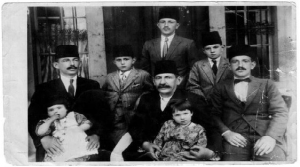
Hamdi Funda Şükrü Funda Cemal Funda
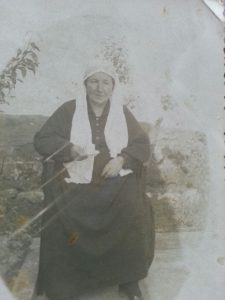
Hamdiye Ana; Feleknaz Anneannemin Annesi
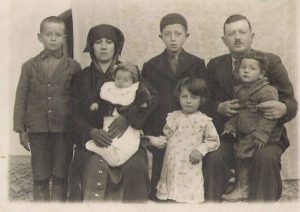
Feleknaz Anneannem, Cemal Dedem
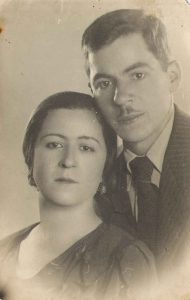
Feleknaz Anneannem, kardeşi Fuat dayı ile..
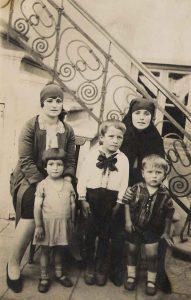
Fadliye babaannem kardeşi Hesna Hanım ile.
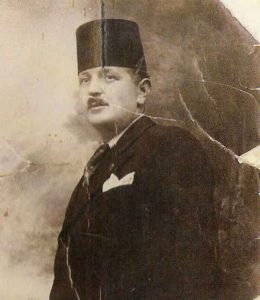
Cemal Funda, Üsküp
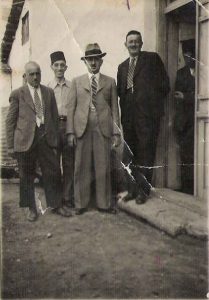
Cemal Funda, Üsküp
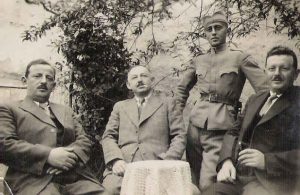
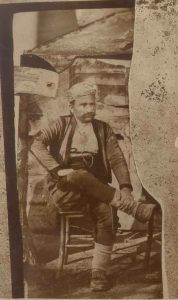
İsmail Ağaoğlu, Grandest Father. Ustina, Pazarcık, Filibe (Plovdiv), Bulgaria İsmail Kosoğlu, 1870. Ustina, Pazarcık, Filibe
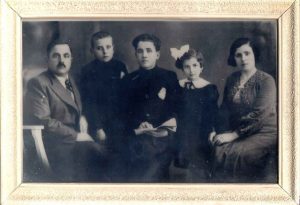
Yakup Ağaoğlu, Fevzi Ağaoğlu, Necati Ağaoğlu, Şukran Ağaoğlu, Fadliye Ağaoğlu
Pazarcık, Filibe

